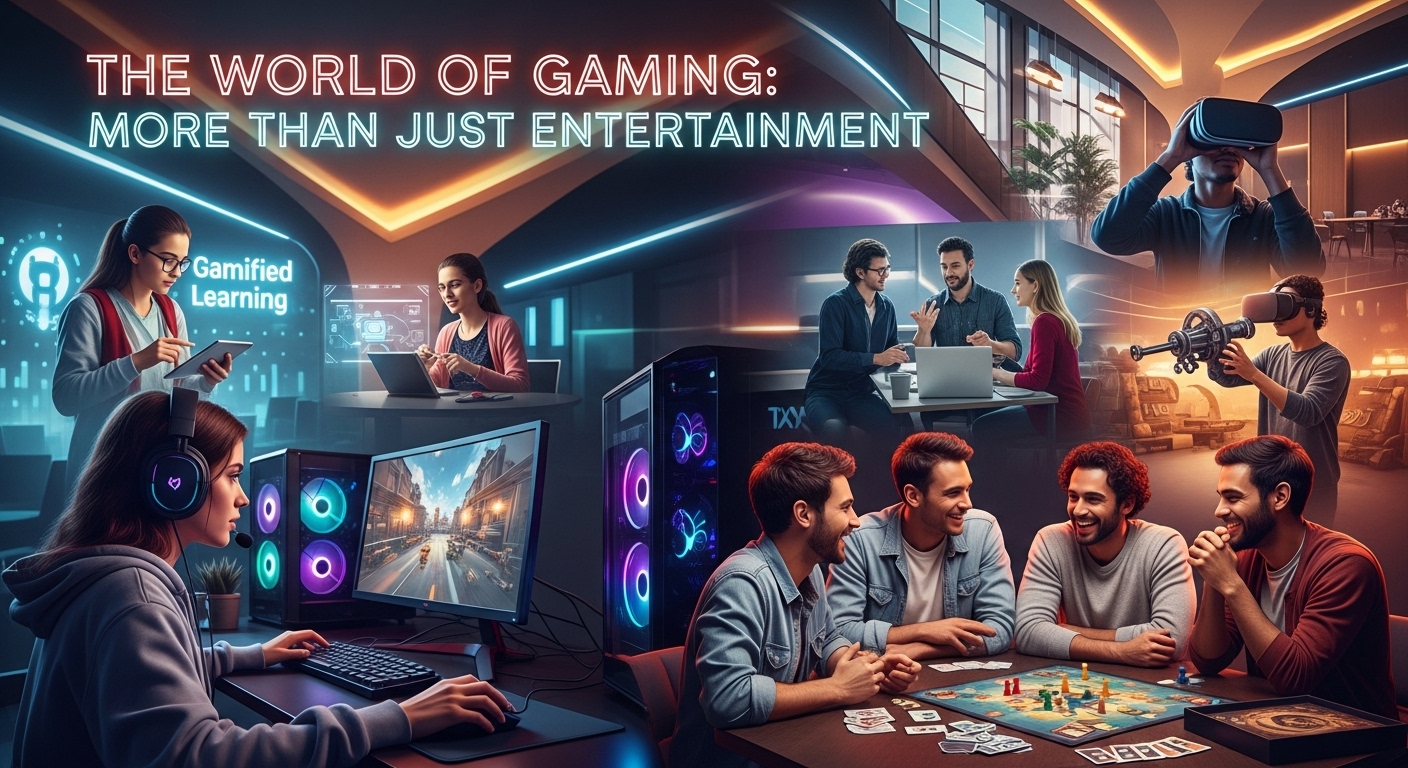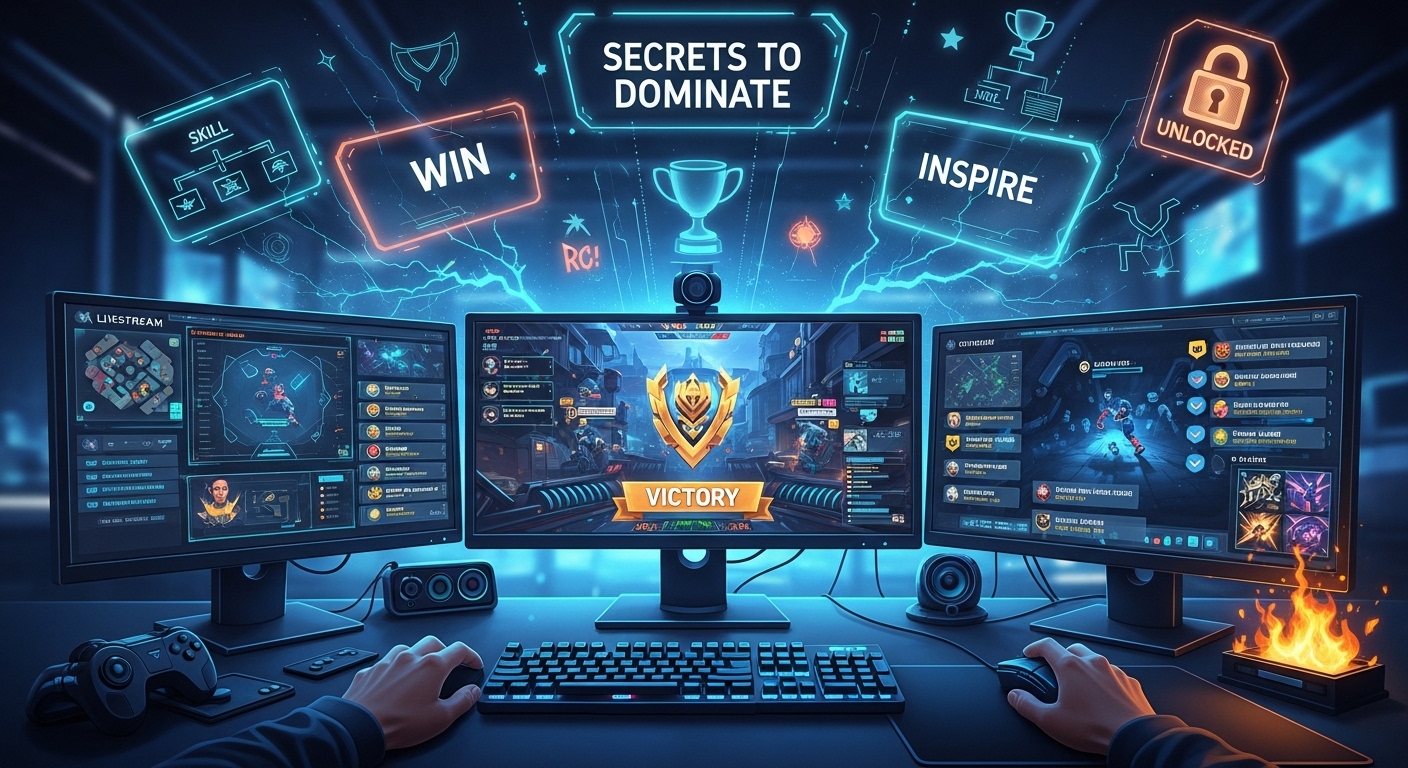Gaming has come a long way from its humble beginnings. What started as simple pixelated adventures on early consoles has transformed into a multifaceted industry that entertains, challenges, and even educates millions of people worldwide. Modern gaming is not just a pastime; it is a cultural phenomenon, a technological marvel, and a powerful social platform. In this post, we will explore the evolution of gaming, its impact on society, the technology behind it, and why it continues to captivate audiences of all ages.
The Evolution of Gaming
The history of gaming dates back to the early 1970s when arcade games became a cultural sensation. Titles like Pong and Space Invaders introduced players to interactive entertainment, creating the foundation for the industry. Early gaming was limited in scope and graphics, but it captured the imagination of a generation.
The 1980s and 1990s saw the rise of home consoles, which brought gaming from arcades into living rooms. Systems like the Nintendo Entertainment System (NES) and Sega Genesis introduced iconic franchises and established gaming as a mainstream hobby. This era also marked the emergence of role-playing games, adventure titles, and platformers that challenged players to think critically and develop strategies.
With the turn of the millennium, gaming became increasingly sophisticated. Graphics improved dramatically, storytelling became more immersive, and online multiplayer gaming started gaining popularity. Titles like World of Warcraft, Halo, and The Sims defined an era where social interaction and narrative depth became as important as gameplay mechanics. Today, gaming is a global phenomenon, with billions of players engaging on consoles, PCs, and mobile devices.
Gaming as a Form of Storytelling
Modern games have evolved beyond simple entertainment. Many titles offer rich, cinematic experiences that rival movies and television shows. Narrative-driven games allow players to immerse themselves in complex worlds, make impactful choices, and form emotional connections with characters.
Games like The Last of Us and Red Dead Redemption demonstrate the storytelling potential of the medium. Players are not passive observers; they actively shape the story through their actions and decisions. This interactivity creates a level of engagement that traditional media cannot replicate. Moreover, games often tackle complex themes such as morality, identity, and human relationships, providing a unique lens through which players can explore real-world issues.
The Social Impact of Gaming
Gaming has become a significant social platform, connecting millions of people worldwide. Online multiplayer games, streaming platforms, and social gaming communities allow players to form friendships, collaborate, and compete. The rise of esports has transformed competitive gaming into a professional career path, offering players fame, fortune, and a sense of purpose.
Beyond entertainment, gaming fosters essential social skills such as teamwork, communication, and problem-solving. Players often collaborate in teams, strategize for challenges, and communicate under pressure, skills that are transferable to real-world situations. Gaming communities also provide support networks for players, helping people connect over shared interests and passions.
The Technology Behind Gaming
The rapid evolution of gaming would not have been possible without technological advancements. Modern games rely on powerful hardware, sophisticated software, and cutting-edge graphics engines to deliver immersive experiences.
Graphics processing units (GPUs) have revolutionized visual fidelity, allowing games to feature realistic textures, lighting, and physics. Game engines such as Unreal Engine and Unity provide developers with tools to create vast, interactive worlds. Artificial intelligence enhances gameplay by enabling NPCs (non-player characters) to react dynamically, creating more realistic and challenging encounters.
Virtual reality (VR) and augmented reality (AR) represent the next frontier in gaming technology. VR headsets transport players into fully immersive digital worlds, while AR games blend virtual elements with the real world. These technologies redefine the boundaries of gameplay and offer new ways for players to experience interactive entertainment.
The Psychology of Gaming
Gaming is more than just fun—it engages the brain in complex ways. Studies have shown that gaming can improve cognitive skills such as memory, attention, and spatial reasoning. Strategy games, puzzles, and simulation titles challenge players to think critically, plan ahead, and adapt to changing situations.
Furthermore, gaming can have emotional benefits. Playing games provides a sense of achievement, fosters creativity, and offers an outlet for stress relief. Multiplayer games encourage social interaction, reducing feelings of isolation and building a sense of community. However, like any form of entertainment, moderation is key, as excessive gaming can lead to negative consequences such as fatigue or social withdrawal.
Mobile Gaming: Gaming on the Go
The rise of smartphones has revolutionized the gaming industry. Mobile gaming offers players the ability to engage in immersive experiences anytime, anywhere. Casual games, competitive multiplayer titles, and mobile adaptations of console classics have brought gaming to a broader audience.
Games like Clash Royale, PUBG Mobile, and Candy Crush have demonstrated the potential of mobile platforms to deliver both addictive gameplay and social interaction. Mobile gaming has also created opportunities for developers to experiment with new monetization models, such as free-to-play with in-game purchases, expanding the industry’s financial scope.
The Rise of Esports
Esports has transformed gaming into a legitimate professional sport. Competitive gaming tournaments attract millions of viewers worldwide, offering substantial prize pools and career opportunities for professional players. Games like League of Legends, Counter-Strike: Global Offensive, and Dota 2 have cultivated massive esports ecosystems, complete with teams, coaches, and dedicated fan bases.
Esports also offers opportunities beyond competition. Streaming platforms like Twitch allow players to broadcast their gameplay, share tips, and interact with audiences in real time. This has created a new form of entertainment and a viable career path for skilled gamers and content creators.
Gaming and Education
Beyond entertainment, gaming has proven to be a valuable educational tool. Educational games can teach subjects such as math, science, history, and language in engaging, interactive ways. Simulation games allow players to explore complex systems, such as city planning or historical events, providing experiential learning opportunities.
Gamification, the application of game principles to non-game contexts, is increasingly used in educational settings. Points, levels, and challenges motivate students to engage with content, enhancing retention and understanding. By combining learning with play, games make education more accessible and enjoyable.
The Cultural Impact of Gaming
Gaming has influenced culture in profound ways. Video game characters, storylines, and aesthetics have inspired fashion, art, music, and film. Iconic franchises like Super Mario, The Legend of Zelda, and Final Fantasy have become cultural touchstones, recognized by people who may not even play games.
Gaming also serves as a reflection of society, exploring contemporary issues such as ethics, politics, and identity. Developers often incorporate social commentary into games, prompting players to consider complex moral dilemmas and societal challenges. In this way, gaming is not only entertainment but also a medium for cultural expression.
The Future of Gaming
The future of gaming promises even more innovation and immersion. Cloud gaming allows players to stream high-quality games without the need for expensive hardware, making gaming more accessible. Artificial intelligence will enable smarter NPCs, more personalized gameplay experiences, and adaptive game worlds.
Virtual reality and augmented reality will continue to expand the boundaries of immersion, while cross-platform play will unify gaming communities across devices. The integration of blockchain technology and digital ownership could reshape how players acquire, trade, and experience in-game assets.
Moreover, the social and cultural influence of gaming will continue to grow. As games become more interactive and inclusive, they will play an increasingly important role in shaping entertainment, education, and communication.
Why Gaming Matters
Gaming is not merely a hobby; it is a dynamic and evolving medium that combines creativity, technology, and social interaction. It challenges the mind, inspires imagination, and fosters connections across the globe. Gaming has become a space where people can escape reality, explore new worlds, and engage with others in meaningful ways.
The impact of gaming extends beyond the screen. It influences art, culture, technology, and society, making it one of the most significant forms of entertainment in modern history. For players, developers, and communities, gaming represents an ever-expanding universe of possibilities—where imagination meets innovation.
Conclusion
Gaming has transformed from a niche pastime to a global cultural force. It has evolved in technology, storytelling, and social significance, offering experiences that entertain, educate, and connect people. From the pixelated screens of the past to the immersive worlds of today, gaming continues to captivate audiences and push the boundaries of creativity.
Whether you are a casual player, a competitive esports athlete, or simply someone intrigued by digital storytelling, gaming offers something for everyone. It is more than just entertainment—it is a testament to human innovation, imagination, and the power of play.
The world of gaming is vast, diverse, and ever-changing. And as technology advances and creativity flourishes, there is no limit to the experiences that await players around the globe. Gaming is not just a pastime—it is a vibrant, dynamic, and transformative part of modern life.



